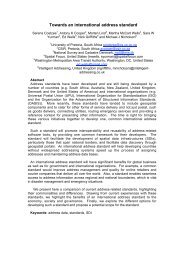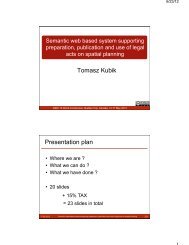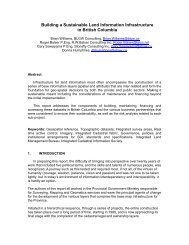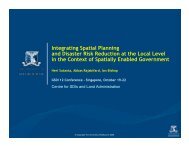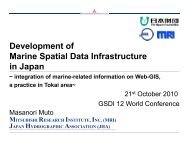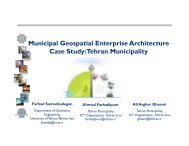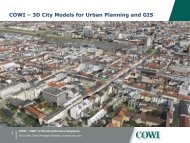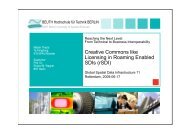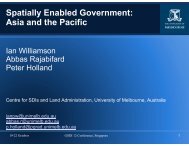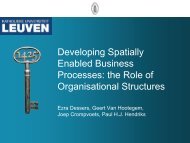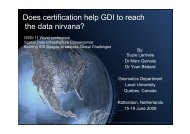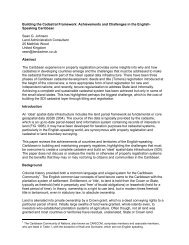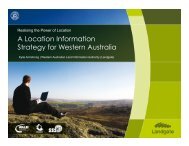SDI Convergence - Global Spatial Data Infrastructure Association
SDI Convergence - Global Spatial Data Infrastructure Association
SDI Convergence - Global Spatial Data Infrastructure Association
You also want an ePaper? Increase the reach of your titles
YUMPU automatically turns print PDFs into web optimized ePapers that Google loves.
Questions of <strong>SDI</strong> are strongly integrated with development of society itself. So, the<br />
question of whether we now are entering a new period in the context of <strong>SDI</strong> depends<br />
on how society will evolve. Describing it in terms used by the analysts ‘Paradigmmaklarna’<br />
(http://www.paradigmmaklarna.com, see Table 1) would mean the following. The<br />
dominating metaphor in society today is ‘knowledge’ but according to them it will soon<br />
change to ‘understanding’. The metaphor for the earlier society (1850 and onwards)<br />
could be named ’energy’. Some key words for these different paradigms further clarify<br />
it.<br />
234<br />
Table 1: Paradigms and key words.<br />
Energy Knowledge Understanding<br />
Muscles Brain Communication<br />
Technique Education Network<br />
Resources Patent Concept<br />
Stationary Long termed Short termed and iterative<br />
Generalist Specialist Complex<br />
Materialist Functionalist Ruled by values<br />
Collective Individual Context<br />
Although all predictions about the future are largely speculation they can give a valuable<br />
indication. If this prediction is correct, this change is clearly in favour of <strong>SDI</strong> and<br />
cooperation. The words under the heading ‘Understanding’ are familiar to those used<br />
in connection with <strong>SDI</strong> and cooperation. This can be an indication that cooperation<br />
which has received more attention during the second period than in the first will be<br />
even more important as a concept in the future.<br />
However, many of the ‘new’ non-technical questions are discussed and explored solely<br />
within the ‘<strong>SDI</strong> community’ and to a lesser extent in contact with other fields of research<br />
and development. For instance, the <strong>SDI</strong> community does not necessarily have<br />
the best experts on organisational issues and should, therefore, seek help in promoting<br />
cooperation. There is at least one interesting study in this context. Koerten (2007) analysed<br />
literature about GIS and <strong>SDI</strong> using organising metaphors. He concludes that the<br />
literature in this field is dispersed and lacks clear focus. Koerten relates to paradigms<br />
and metaphors in organising theory. He sees the need for a shift from the dominating<br />
‘functionalist paradigm’ to the ‘interpretationist paradigm’ which represents revolutionary<br />
science and a shift from the objective realm to a subjective realm. He welcomes<br />
encounters with the interpretationist paradigm. He states that what is considered as a<br />
revolutionary paradigm for GIS and <strong>SDI</strong> is already orthodox in organisational science.<br />
He concludes that we need more knowledge about organising, interorganisational networks<br />
and cooperation strategies. This, he states, calls for unorthodox researchers,<br />
willing to use theories that focus on what goes on in people’s minds rather than focusing<br />
on organisational structures.<br />
Koertens study seems to support and strengthen the indication above that cooperation<br />
will be of more importance in the field of <strong>SDI</strong>. It also gives a clear hint that new ways of<br />
doing research are essential and that the ‘<strong>SDI</strong> community’ should cooperate better with<br />
other fields, for instance organisational research.



